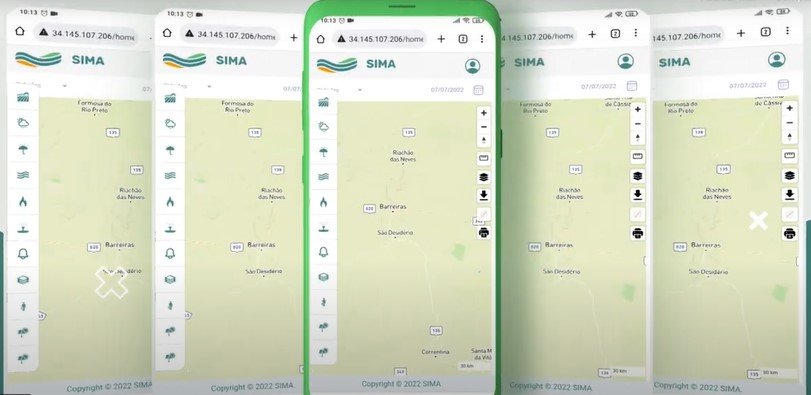International partnership develops digital platform for agriculture sustainability in western Bahia
With support from the Land Innovation Fund, Senai Cimatec, Fundação Solidaridad and the Associação de Agricultores e Irrigantes da Bahia (Aiba) implement an integrated management tool for the region.
The Territorial intelligence and environment monitoring system (SIMA) is a digital platform for managing territorial and environmental data and indicators on the soy supply chain in Western Bahia, gathered into a single system through the contribution of several partners. Developed by Senai Cimatec especially for the Association of Farmers and Irrigators of Bahia (Aiba), in collaboration with the Solidaridad Foundation and with support from the Land Innovation Fund, SIMA provides integrated access to general farm information, at the push of a button.
SIMA has modules dedicated to water resource management and land use, as well as a carbon calculator, developed by the Solidaridad Foundation, to estimate the carbon balance on farms and help make decisions on best agricultural practices to achieve sustainable development. The system provides information about polygons of rural properties, city and watershed boundaries, meteorological and fire risk data, SICAR and ICMBio data, information about indigenous lands, archaeological sites, and ecological corridors, among other features that make SIMA a valuable source of information for decision-making in the field.
Following exchanges among the AIBA, Senai Cimatec and Solidaridad Foundation teams, with the participation of local farmers, this integrated solution was designed to facilitate the management of soy farms in one of Brazil's most productive agricultural areas, and to encourage the adoption of sustainable, low-carbon management practices to mitigate climate change. The Territorial intelligence and environment monitoring system (SIMA) is one of the four projects of the Innovation and Sustainability program underway in Western Bahia, with support from the Land Innovation Fund. The platform is already available for AIBA members, on the institution's website.
"We recognize the importance of Western Bahia for agribusiness and the efforts of local producers to align the production of some of Brazil's main commodities with international demands for the preservation and restoration of this biome. We have therefore combined efforts and investments into integrated projects capable of generating positive impacts on the region's soy production chain," says the Land Innovation Fund's director, Carlos E. Quintela. "AIBA, the Solidaridad Foundation and Senai Cimatec are working on projects that can consolidate Western Bahia as a benchmark for sustainable actions by agribusiness," he adds.
INTEGRATED SOLUTIONS INTO A PORTFOLIO FOR SUSTAINABILITY
In addition to Senai Cimatec's digital platform, the Solidaridad Foundation developed a carbon calculator adapted to the reality and needs of Western Bahia. As part of the SIMA system, the calculator presents a profile of the carbon balance for the region's soy production and supports the farms' sustainable management. Twenty farmers, who cultivate about 61 thousand hectares of soybeans in five municipalities in Western Bahia – São Desidério, Luís Eduardo Magalhães, Barreiras, Formosa do Rio Preto, and Correntina – provided information on their management systems, productivity, and agricultural operations to determine the baseline, adjust the calculator, and determine the carbon balance on each farm involved in the project. The data they collected are also part of a comprehensive study on carbon mapping in different soil scenarios for soy production in Matopiba, carried out by the Solidaridad Foundation and published on the institution's website.
The largest farmers' association in Bahia coordinates field activities and communications for the Fund's projects in Western Bahia. With Senai Cimatec, AIBA contributed to the operation and validation of SIMA's modules. With the Solidaridad Foundation, AIBA secured the participation of farmers in the Carbon Balance project’s activities in the region. Throughout 2021, AIBA also helped promote AIBA LAB events, which are open contests held in partnership with Senai Cimatec and with the Fund's support to help open pathways towards innovation for sustainability, with the collaborative participation of farmers, students, researchers, local communities and partner institutions in the region.
"Initiatives supported by the Fund, in partnership with important institutions, have laid the foundation for sustainability in Western Bahia, using the tripod of territorial management, engagement, and changes in agricultural practices. With greater awareness that sustainability and innovation go hand in hand, the fruits of our future endeavors are promising," says AIBA's Sustainability Manager, Enéas Porto.
The AIBA LAB attracted more than 80 participants and helped everyone understand the demands, challenges and opportunities for sustainable agricultural development in Western Bahia. The program also identified fifteen startups capable of fostering an innovation landscape for sustainable and climate-smart agriculture in the region. Learn more about the selected startups on the Fund's website.
ABOUT THE LAND INNOVATION FUND:
Initially funded by Cargill, and managed by Chemonics International, the Land Innovation Fund supports the design, development, and delivery of innovative solutions for sustainable and climate-smart agriculture, free from deforestation and conversion of native vegetation, in three of South America’s priority biomes: Cerrado, Gran Chaco and Amazon. Since its launch in January 2021, the Fund has supported 28 projects working with 34 partners in the region, engaging more than 1,300 farmers and covering approximately 1.6 million hectares.

